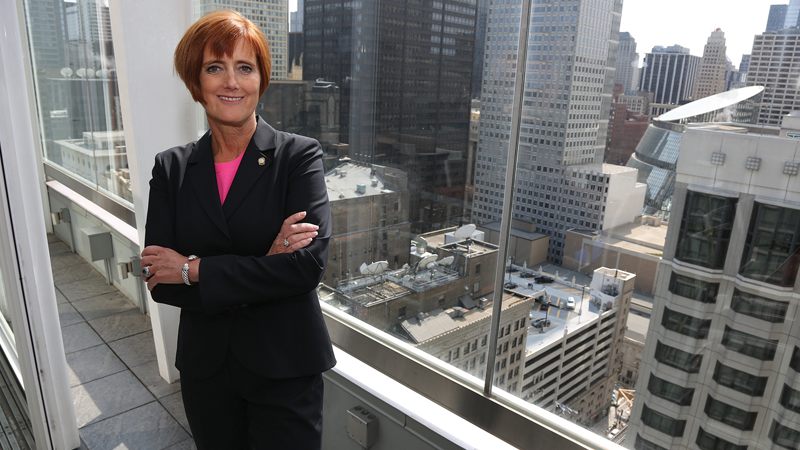Deborah J. Bowen assumed the role of president and chief executive officer of the American College of Healthcare Executives (ACHE) on May 13, 2013 upon the retirement of Thomas C. Dolan, PhD, who had led the organization for 22 years.
Deborah first joined the ACHE in December of 1992 as the director of government relations; two years later, she was promoted to the role of vice president for the association’s administration division. In 2000, Deborah left ACHE to serve as the deputy executive director for the Society of Actuaries in Schaumburg, Illinois, but returned three years later as the association’s EVP and COO. During her tenure with the ACHE, Deborah has been instrumental in helping to drive the association toward performance excellence, including leading its first state-level Baldrige application, which ultimately resulted in the 2016 receipt of the Illinois Performance Excellence Gold Award for Achievement of Excellence.
Deborah is originally from Park Ridge, Illinois. She holds a master’s degree in social work from the University of Wisconsin Madison, and an MBA in management and marketing from Loyola University Chicago. Deborah is board certified in healthcare management as an ACHE Fellow, and has participated in numerous national organizations and committees. She has served in board leadership roles for the Commission on Accreditation of Healthcare Management Education, the Institute for Diversity in Healthcare Management, and the Association Forum of Chicagoland. Deborah is a Baldrige Executive Fellow, a Fellow of the American Society of Association Executives, and a Certified Association Executive.
The American College of Healthcare Executives is an international professional society of 40,000 healthcare executives who lead hospitals, healthcare systems and other healthcare organizations. ACHE’s mission is to advance its members and healthcare management excellence. ACHE offers its prestigious FACHE® credential, signifying board certification in healthcare management. ACHE’s established network of 78 chapters provides access to networking, education and career development at the local level. In addition, ACHE is known for its magazine, Healthcare Executive, and its career development and public policy programs. Through such efforts, ACHE works toward its vision of being the preeminent professional society for healthcare executives dedicated to improving health. The Foundation of the American College of Healthcare Executives was established to further advance healthcare management excellence through education and research. The Foundation of ACHE is known for its educational programs—including the annual Congress on Healthcare Leadership—and groundbreaking research. Its publishing division, Health Administration Press, is one of the largest publishers of books and journals on health services management, including textbooks for college and university courses. Chicago will host ACHE’s 2017 Congress on Healthcare Leadership, entitled “Discovering Possibilities & Opportunities,” beginning on March 27; the four-day conference is expected to draw more than 4,000 participants. QLK spoke with Deborah about the Congress, her background, and her advice for young professionals.
Tell us a little bit about what it’s like for over 4,000 people to come to Chicago for the Congress.
Inspiring – being with that many people can be very energizing. Congress is a combination of a lot of things; we’re doing a lot of things to encourage and engage people not only to meet each other, but to get great education on topics that are relevant, timely and meaningful. We’ve got great speakers lined up.
How do you handle the logistical challenge of the wealth of meetings and people?
First of all, we’ve been at it a while, so experience counts. We’re always learning and improving things, but the “secret sauce” is that I have a great team of experienced planners who are professionals in their own right. So we have good systems and good people in place.
We all get excited about Congress because for many of our staff, it’s really the only time all year that they actually get to meet the individuals we serve every day. A lot of our staff engage with people over the phone or via email, so we try and turn Congress into an opportunity to better understand our members.
You also have to remember, the staff are working on Congress for basically an entire year; it’s a continuous, disciplined process for us. In recent years, we’ve actually been starting [the planning for the following year’s Congress] before [the current year’s Congress starts]; the RFP for the 2018 Congress sessions is already out in the field.
How did you get into association work?
I grew up in Chicago, and I always wanted to do something that I thought would make the world a little better place. I went to school in Madison, graduated with a master’s in social work, and started counseling people. I was counseling heroin addicts and alcoholics, which was very challenging work, but through that work, I met a physician who happened to be the chairman of the Wisconsin Medical Society. He encouraged me to try my hand at association work, and I took an open position there. I really loved having the opportunity to work with decision-makers, because if you can influence a decision-maker, you can impact a lot of people. I loved the reach and impact that associations offer in terms of the work; it appealed to my appetite to contribute in a meaningful way. I worked there for 12 years; in my very first “professional-level job,” that really opened new doors for me.
Do you miss that social work aspect or are you really “in your wheelhouse” now?
As a leader, I probably borrow from my social work experience. I have since gone back and gotten an MBA, as well, and I think the combination of a business background and a “people” background is a good combination for leading an individual professional membership society.
How has the CEO role been different from what you expected?
I’m not sure if I knew exactly what to expect. I don’t know if anybody can really prepare you for the opportunity and the responsibility of the role. Tom was a great mentor for me; I worked with him for years, and he encouraged me, inspired me, and cultivated me, so I owe him a lot of thanks. The environment is so different nowadays with the uncertainty in health care, etc., and I think every leader has to understand how they can contribute in their own way. I tried not to think about the shoes I was filling, more about the impact I could have as a leader. I think it’s easy to compare yourself, and frankly, I just didn’t want to fall into that trap. I tried to focus more on what kind of difference I wanted to make and how I could leverage the great leadership community we have to achieve our mission and vision. We are fortunate to have great leadership at ACHE – including a great Board of Governors – people who care about making things better – and that made my transition a lot easier.
Tell me about your early years. What were some early leadership lessons you had?
In those years, I think you’re always hungry to contribute and make your own mark. I always tried to focus on how I could add value. I think you have to be a planner, a learner, working hard, and trying to make yourself indispensable. I think the most valuable thing I did, in retrospect, was to treat everybody with respect and to not get too distracted by office politics or any other distractions. When you’re young and growing up you are trying to understand and navigate the environment. Every organization has its own culture and politics, so I always tried to just “put my nose to the grindstone,” and that strategy always paid off for me.
What career and life advice do you give to new hospital graduates and executives?
Obviously you have to know where you want to go. I think you have a greater ability to get where you want to go if you have a plan. I would encourage people to assess where they really want to go and where they want to make a difference. You need to have a personal vision statement for yourself and a view of your strengths and development needs.
We had a Congress speaker a few years back, Tim King, who launched Urban Prep Academy here in Chicago. He takes young African-American males who might otherwise be destined for the gangs and provides them with academic preparation, social skills, and the confidence to ensure they graduate from high school so they can move on to college – establishing a platform for their life success. One thing he said that stuck with me is that “if you can’t see it, you can’t be it.” I think that is so true; the more you are in tune with where you want to head and where you want to contribute, the faster you’ll get there.
The other thing I always tell people is that you have to have a good understanding of your values and make sure that you’re taking care of others along the way. In today’s environment, I think it’s important to make sure that we’re building this culture of “and” – making sure that we’re encouraging, appreciating, and inspiring each other is an important aspect of how leaders can really help each other and come into their own.


